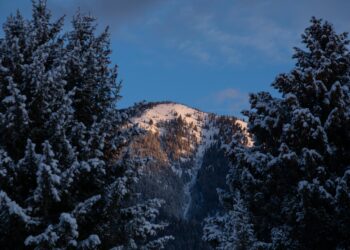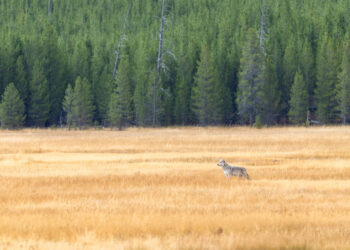By Gary Wockner Writers on the Range
It feels like an apocalypse in the Southwest — wildfires, floods, drought, heat, smoke. This was not the norm when I moved to Colorado 35 years ago. Climate scientists may have predicted the arrival of these extreme events, but many admit their predictions have come true faster than they expected.
One outcome they pinpointed was the impact of heat and drought on water flows in the Colorado River. For the last 20 years this new climate, combined with booming human population growth, has parched landscapes, drained reservoirs and incited talk of water wars across the region. Lake Powell on the Colorado River, and Glen Canyon Dam which creates the reservoir, have become casualties of this strained environment.
Lake Powell is the second largest reservoir in the United States, but in the last year alone its water level has dropped 52 feet and the reservoir now sits at 31.4 percent full.
If you’re a pessimist, that’s over 68 percent empty. Water managers are already imposing cuts in water deliveries in some states; all their choices are filled with political pitfalls.
A further complication is that the federal government operates a hydroelectric plant at Glen Canyon Dam that provides cheap electricity to parts of the Southwest. The day is coming when the hydroelectric turbines will stop for want of water to spin them.
To save the lake and generate electricity, the government needs water. But where will that water come from?
Upstream of Lake Powell, in Utah, Colorado, Wyoming and New Mexico are millions of acres of irrigated farms and ranches that suck massive amounts of water out of the Colorado River before it reaches Lake Powell. If those farms and ranches quit taking water and instead ran that water downstream, the lake and its electricity could be saved. To ensure that outcome, the federal government has hatched a plan it calls “demand management,” which proposes to buy or lease massive amounts of farm and ranch water to prop up Lake Powell.
On the one hand, the farmers and ranchers would get paid for the water, and likely paid very well. If I were a rancher who owned water, I’d sit comfortably until the offering price for my water made me even more comfortable.
On the other hand, lots of people and businesses believe that irrigated farming, ranching and outdoor recreation are not only central to the region’s economy, but also to its culture. Should that economy — and the soul of the Southwest — be sacrificed to save a manmade reservoir and its hydroelectricity?
I’m torn by this dilemma. If farms and ranches are dried up, more water flows down the river. More water in the river benefits fish and the environment. But there’s another solution: We can save farms and ranches and instead drain Lake Powell, freeing the Colorado River to flow free through 169 miles of a drowned and beautiful place called Glen Canyon.
There’s always the “save hydroelectricity” argument, but it’s a red herring. There are other ways to generate electricity, including wind and solar. In fact, if you’ve ever stood near Glen Canyon Dam and its hydropower plant, you can’t help noticing that it’s surrounded by millions of acres of dry, sun-drenched landscape that would make a great place for a solar electricity farm.
Electricity can be replaced; farms and ranches cannot.
As we grapple with these tradeoffs, it’s important to remember that even lower water flows are projected for the future, plus more severe heat and drought that will become the “new normal” for the Colorado River and the entire region. Lake Oroville, California’s second largest reservoir, now has inactive hydro turbines because there’s not enough water to turn them, its dusty lakebed a harbinger of what’s to come for Lake Powell.
Let’s also remember that Glen Canyon Dam was finished in 1963 and it and Lake Powell are only 58 years old. The region lived without them before, and it can live without them again. Now, nature is forcing our hand, telling us that it’s time to breach the dam and let the Colorado River run free.
Gary Wockner is a contributor to Writers on the Range, writersontherange.org, a nonprofit dedicated to spurring lively conversation about the West. He is a river-protection activist based in Colorado and runs the nonprofit Save the Colorado.














